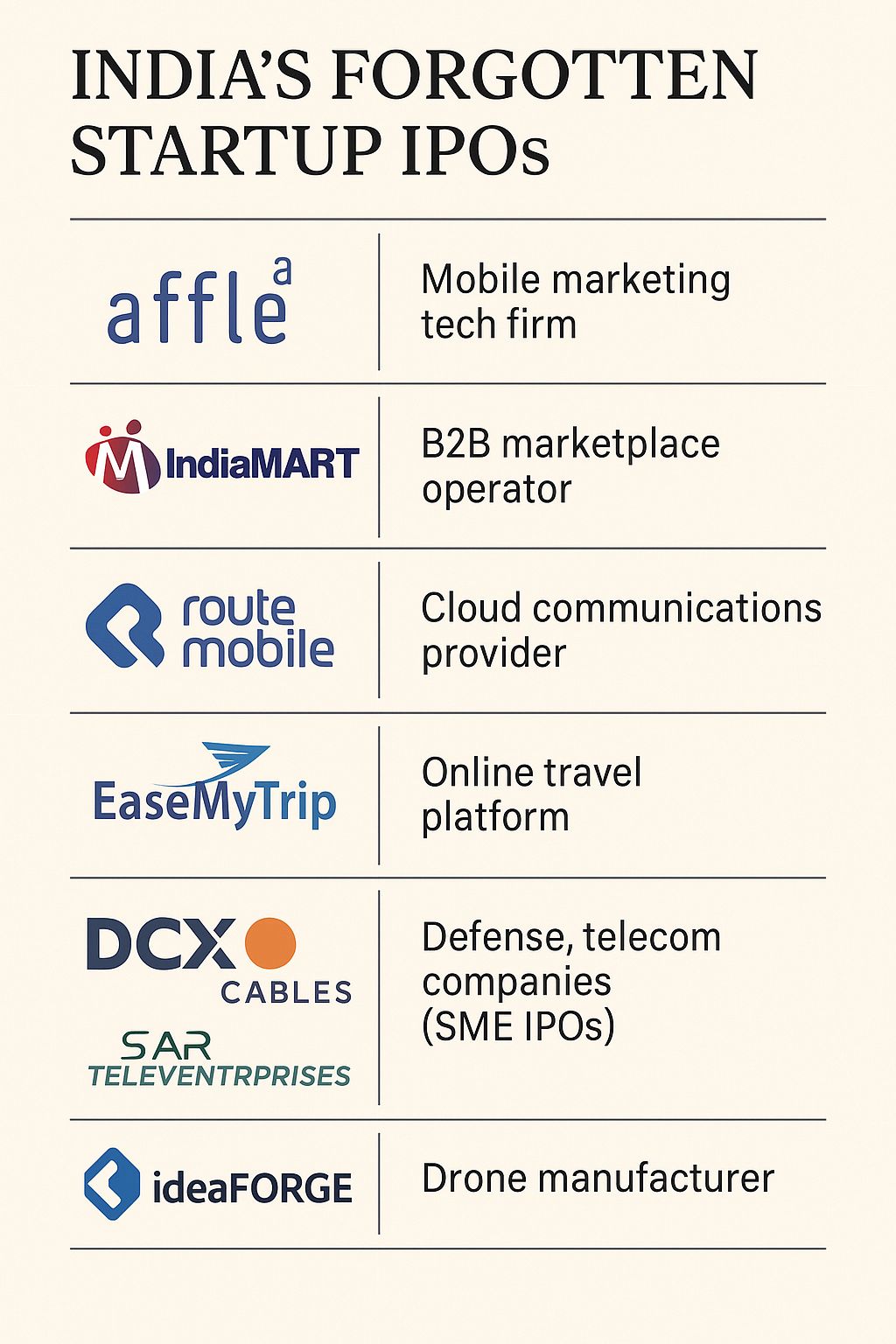- Startup Chai
- Posts
- (The Weekend Insight) - No Hype, Just Profits: India’s Forgotten Startup IPOs
(The Weekend Insight) - No Hype, Just Profits: India’s Forgotten Startup IPOs
India’s startup IPO story goes beyond Zomato and Paytm - meet the quiet performers who listed without noise and delivered real value.

In today’s deep-dive, we explore the startup IPOs that didn’t make it to prime-time TV or Twitter trends. These are the companies that listed quietly, skipped the noise, and focused on profits over hype.
For every Zomato and Paytm that made headlines with their IPOs, there are a dozen other Indian startups that quietly went public - no massive PR blitz, no prime-time debates, no Twitter euphoria. These companies skipped the noise, listed on the stock exchanges, and have gone on to build profitable businesses in the shadows of their overhyped peers.
Take IndiaMART, for instance. Founded in 1999, long before startups were even called startups in India, it listed in 2019. It wasn’t backed by flashy VCs. It wasn’t built in a hyper-funded bubble. And yet, the company posted strong financials even before listing and has remained profitable since. In fact, it became India’s first listed B2B marketplace - and rewarded its shareholders along the way. At its peak, IndiaMART's stock rose over 500% post-IPO. But unless you were deeply plugged into startup finance, you probably missed it.
Then there’s Affle India, a global adtech player most people haven’t heard of outside industry circles. It went public in 2019 and since then has delivered strong returns. Affle builds tech that helps advertisers target mobile users better - and it’s profitable, operates across 20+ countries, and keeps growing without much noise. It’s the kind of company that many mistake for an IT services firm, when in fact, it’s a full-stack SaaS-like play born out of India.
Route Mobile is another such story. While everyone was chasing consumer tech unicorns, Route Mobile built a CPaaS (Communication Platform as a Service) business, helping businesses communicate with customers over SMS, voice, email, and WhatsApp. When it listed in 2020, the IPO was subscribed 74 times. Since then, it’s grown into a ₹10,000+ crore market cap company with global clients and a presence in over 20 countries. And yet, Route Mobile is rarely mentioned in India’s mainstream startup coverage.
EaseMyTrip tells a different kind of story. In an industry where companies like MakeMyTrip burned massive amounts of capital and still remain unprofitable, EaseMyTrip did the opposite. It bootstrapped its way to IPO, never took external funding, and turned a profit every year. When it went public in 2021, the company was already known for its cost-efficient model - no convenience fees, no marketing blitz, just steady word-of-mouth growth. Since then, it has remained profitable and has even ventured into new verticals like luxury hotels and event ticketing. Its founders, the Pitti brothers, kept a low profile, focused on margins, and listed the company without ever making a noise.
LatentView Analytics went public in 2021. An analytics and data science company that serves global clients, it had a strong track record and good financials prior to its IPO. LatentView isn’t building a mass-consumer app. It helps businesses make sense of their data. That’s it. But it does it so well that its IPO was subscribed over 300 times - one of the highest in Indian startup history. Yet, you won’t find founders of LatentView doing panel discussions on the future of Indian entrepreneurship.
MapmyIndia, another under-the-radar success, went public in 2021. While the world obsessed over Google Maps, this Indian mapping and geospatial company built a business supplying maps and location tech to logistics, automakers, and the government. Its IPO was oversubscribed 154 times, and its stock continues to be a stable performer.
Droneacharya Aerial Innovations, a Pune-based startup offering drone services and training, listed on the BSE SME platform in December 2022. Its IPO was oversubscribed more than 260 times - a reflection of how bullish retail investors are on futuristic tech solutions. Despite being an SME IPO, the listing attracted a large number of HNIs and retail investors drawn by the promise of India's growing drone economy.
Another SME example is ideaForge Technology, a maker of unmanned aerial vehicles for defense and industrial applications. It saw its IPO oversubscribed by more than 100 times in 2023. Backed by funds like Florintree Advisors, the startup benefitted from the government’s Production Linked Incentive (PLI) scheme and rising interest in defense tech. The reason investors liked ideaForge was obvious: it was one of the rare Indian startups with its own technology and confirmed orders from the Indian Army.
Even more recently, startup IPOs like Netweb Technologies (a server and computing solution provider) and Yudiz Solutions (a blockchain and game development firm) made headlines in SME circles. While they lacked brand recall among urban consumers, both IPOs found strong traction due to high-growth narratives and solid execution metrics.

The kind of investors participating in these IPOs is also changing. Beyond retail investors, there is a visible shift in institutional interest. Domestic mutual funds, family offices, and long-term HNIs are increasingly turning to these quiet, profit-first tech plays. Their rationale is simple: unlike burn-heavy unicorns, these companies offer clean balance sheets, dividend potential, and credible governance histories. Some, like IndiaMART and LatentView, even find their way into ESG (Environmental, Social, Governance)-themed portfolios due to their business models and disclosure practices.
There’s also a new breed of angel investors and early-stage funds who see SME IPOs as real exits. Unlike traditional VC cycles that take 8-10 years, these SME listings give early backers liquidity in 4-6 years. As more founders look beyond unicorn dreams and towards profitability, the SME IPO path is becoming an attractive alternative.
What makes these IPOs forgotten is not their lack of success - it’s their lack of spectacle. These are not startups built for Twitter threads. They were not founded by IIT-IIM dropouts chasing hyper-growth with burn-heavy models. Instead, most of these companies were bootstrapped or raised modest capital. They got to profitability before going public. And they’ve delivered steady value post-IPO, sometimes more than the celebrated unicorns.
So why don’t we hear about them?
Part of the reason is narrative bias. Media and VCs alike chase the next big thing - the 100x story, the moonshot, the blitzscale play. A company like Affle, growing steadily and profitably, doesn’t fit that narrative. There’s also the consumer-tech skew. Enterprise startups, SaaS players, data firms - they’re not sexy. They don’t generate memes. But they make money.
And then there’s timing. Many of these IPOs happened either just before or during the pandemic, when attention was elsewhere. The noise around Paytm’s flop IPO, Nykaa’s volatile performance, or Zomato’s listing sucked all the oxygen from the room. In contrast, companies like IndiaMART or Route Mobile simply kept executing.
It’s also worth noting that many of these companies were older. IndiaMART started in the 90s. Affle was founded in 2005. These weren’t fresh-out-of-college founders with big dreams and zero revenues. They were seasoned operators who built with care, sometimes over decades. By the time they went public, they had solid fundamentals. But that made them seem less like startups and more like boring old companies - even if their business models were deeply tech-driven.
Ironically, the very traits that made these companies successful - focus on profitability, lean operations, lack of hype - are also the reasons they’re ignored. In a funding-obsessed ecosystem, bootstrapped success isn’t cool.
But the market doesn’t care about cool. Over time, investors are realizing that hype doesn’t equal value. Paytm’s stock fell over 70% post-listing. Zomato and Nykaa have seen wild swings. Meanwhile, IndiaMART, Route, Affle, and EaseMyTrip have delivered consistent returns.
Perhaps it’s time we recalibrated what startup success looks like. An IPO isn’t just a liquidity event. It’s a statement that a company is ready for public scrutiny, has predictable cash flows, and can survive without VC lifelines.
How did today's serving of StartupChai fare on your taste buds? |
